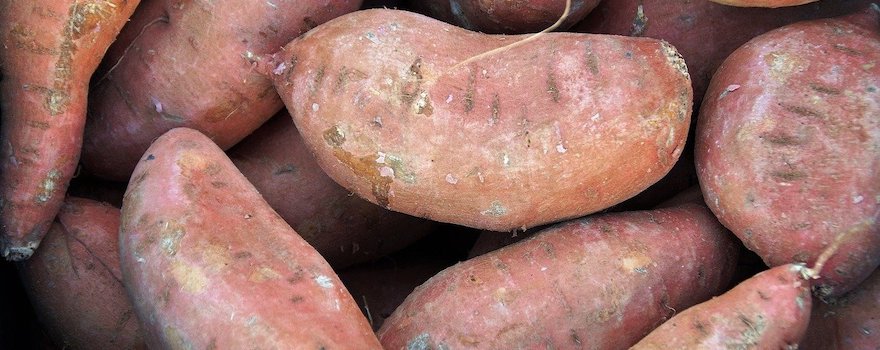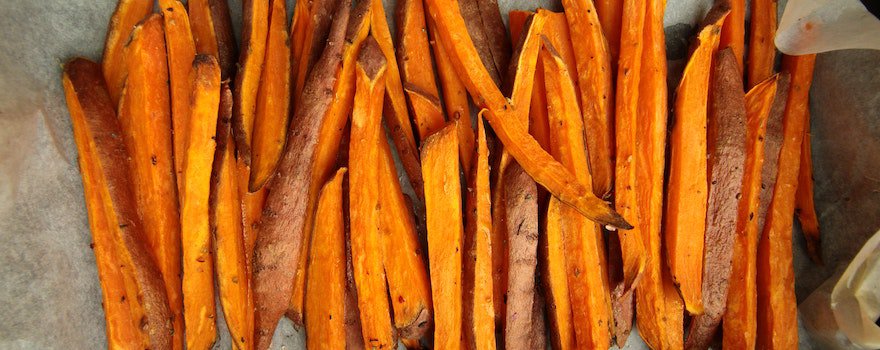BENEFITS OF SWEET POTATO
✓ Improves diabetes
✓ Relieves digestive disorders
✓ Anti-inflammatory
✓ Aids in weight loss
✓ Potentially anti-cancer
What is a sweet potato?
The sweet potato, scientifically known as Ipomoea batatas, belongs to the Convolvulaceae family. This family includes plants native to tropical and subtropical regions such as the sweet potato, which thrives in South America: Peru, Ecuador, Venezuela… Thanks to its great adaptability, its cultivation has also spread to Africa, Asia, and Polynesia.
Even though its leaves and stems are edible, the sweet potato is mainly grown for its tubers, which can weigh up to 5 kg.
They can be consumed like potatoes, ground into flour, or made into syrup or jam. These tubers are appreciated for their sweet flavor and creamy texture.
But beyond its taste qualities, the sweet potato offers numerous health benefits. Particularly rich in vitamins and minerals, it also contains antioxidants. Various studies have shown its benefits in improving diabetes, relieving digestive disorders, and reducing inflammation. Its low-calorie content also makes it an appealing choice for weight loss. Finally, the sweet potato shows anti-cancer potential.
Like moringa or spirulina, it represents an interesting solution to malnutrition. Thanks to its rich nutrient content, it helps combat deficiencies and growth delays in children in developing countries. For some researchers, the sweet potato is a possible solution to food insecurity in some African countries.
Nutritional composition
- Amino acids
- Vitamins: pro-vitamin A, B1, B5, B6, B9, C, K
- Minerals and trace elements: potassium, manganese, iron, magnesium, phosphorus, zinc, copper, calcium, sodium
- Lipids
- Proteins
- Carbohydrates
- Fibers
- Antioxidant compounds: polyphenols, anthocyanins
- Starch
- Water

The benefits of sweet potato
🍭 Improves diabetes
With about 3g per 100g, the sweet potato is a good source of dietary fiber. These fibers contribute to glucose absorption and reduce blood sugar spikes after meals. Furthermore, the fibers improve insulin sensitivity, thereby helping to lower blood sugar levels.
It also contains bioactive compounds that aid in diabetes control, such as glycoprotein and anthocyanins. These compounds slow down glucose absorption in the small intestine and increase insulin production.
This study from the University of Faisalabad (Pakistan), conducted on diabetic rats, shows how it improves diabetes.
♻️ Relieves digestive disorders
Thanks to its fiber content, the sweet potato supports digestion and the proper functioning of intestinal transit. It helps relieve certain disorders such as constipation and diarrhea by improving the frequency and consistency of stools.
It also contains other nutrients that contribute to intestinal comfort. Magnesium, for example, acts as a mild laxative. Furthermore, the raw tuber contains about 75% water, which facilitates the movement of stools in the intestines.
This study from the University of Soochow (China), conducted on patients suffering from constipation, shows its positive impact on transit.
🔥 Anti-inflammatory
The sweet potato shows anti-inflammatory action on both acute and chronic inflammations. Thus, its regular consumption helps relieve edema, arthritis, and even asthma. By eliminating inflammation in the brain, it also helps slow cognitive decline.
Moreover, its antioxidant polyphenols prevent the release of pro-inflammatory cytokines. They also reduce oxidative stress, which sustains inflammation.
This study from Quaid-i-Azam University (Pakistan), conducted on rats, shows the anti-inflammatory and anti-arthritic action of sweet potato.
🏃🏻♂️ Aids in weight loss
Because it is rich in fiber, sweet potato is an interesting food for maintaining or losing weight. Its soluble fibers increase the feeling of satiety, thus reducing snacking cravings during the day.
It also has the advantage of being low in calories (about 75 kcal per 100 g). Finally, by promoting intestinal transit, it also helps to maintain a flat stomach.
This study from Uyo University (Nigeria), conducted on rats, shows how it reduces appetite and increases satiety.
🔬 Potentially anti-cancer
Sweet potato contains many antioxidants including polyphenols and anthocyanins. Like eleutherococcus, it contains caffeic and chlorogenic acids, phenolic acids with anti-cancer effects. Indeed, they prevent the proliferation of cancer cells and induce their apoptosis (programmed cell death).
This study from Kansas State University (United States), conducted on animal cells, shows its anti-cancer potential.

How to consume sweet potato?
Fresh sweet potato
Sweet potato is increasingly present on the stalls. Always choose a firm and heavy potato, without odor and without bruises.
In cooking, it advantageously replaces traditional potatoes because it is richer in fiber, vitamins, and minerals. It is also appreciated for its sweet flavor and melting texture. Generally, there are 2 main varieties:

- the white-fleshed one, with a milder taste and a more floury texture
- the orange-fleshed one with a sweet taste and firmer texture
It’s a versatile food that can be cooked in many ways, both in savory and sweet versions. You can steam it, roast it, make it into puree, fries, add it to soups… It’s also interesting for original desserts (muffins, pies, pancakes…) like the famous Reunion Island sweet potato cake.
Sweet potato flour
Once harvested, the tubers are cut, dried, and then ground to obtain a fine flour with a rather sweet taste. Like rice, quinoa, and buckwheat flour, sweet potato flour is gluten-free. It is therefore ideal for people who are intolerant, allergic, or sensitive to gluten.
This flour can completely replace wheat flour or be combined with other gluten-free flours. It is used for making cakes and pastries, bread, pasta, and pancakes… The flour can also be added to smoothies, protein shakes, and health drinks.

Consume sustainably: favor organic, local, and fair-trade sweet potatoes
✓ China, Malawi, and Tanzania are the main producers of sweet potato. Its cultivation is particularly important in Africa, as seen here in Ghana, where it supports many local producers. In France, sweet potato cultivation is still rare but is slowly emerging in certain departments like the Landes, Gironde, or in Vendée.
✓ If you can, prioritize French-grown sweet potatoes and those from organic farming. There might be some near you! Moreover, buying fair-trade potatoes also supports the work of small farmers.
Dosage
There is no specific recommended dosage. Just make sure not to consume it excessively.
Contraindications and side effects
The consumption of sweet potato presents certain contraindications :
- Due to its oxalate content, people with kidney stones should consume it in moderation;
- Its consumption may cause allergies in sensitive people;
- Because it contains oxazolidones, it is not recommended for people with thyroid disorders.
Excessive consumption poses certain side effects:
- Gallstones
- Kidney stones
- Allergic reaction
If you experience side effects, stop consuming it and consult a doctor.
Report by Julia Perez
Sources and scientific studies
Naheed Akhtar, Muhammad Akram, Muhammad Daniyal, Saeed Ahmad, 2018. Evaluation of antidiabetic activity of Ipomoea batatas L. extract in alloxan-induced diabetic rats.
Jing-Ying Zou, Yi Xu, Xiao-Hua Wang, Qing Jiang, Xia-Ming Zhu, 2016. Improvement of Constipation in Leukemia Patients Undergoing Chemotherapy Using Sweet Potato.
Muhammad Majid, Bakht Nasir, Syeda Saniya Zahra, Muhammad Rashid Khan, Bushra Mirza, Ihsan-Ul Haq, 2018. Ipomoea batatas L. Lam. ameliorates acute and chronic inflammations by suppressing inflammatory mediators, a comprehensive exploration using in vitro and in vivo models.
Th Olubobokun, Eo Aluko, Ee Iyare, Usb Anyaehie, Ed Olatunbosun, Gi Aizenabor, 2014. Aqueous Extract of Ipomoea batatas Reduces Food Intake in Male Wistar Rats: A Pilot Study.
Soyoung Lim, Jianteng Xu, Jaeyong Kim, Tzu-Yu Chen, Xiaoyu Su, Joseph Standard, Edward Carey, Jason Griffin, Betty Herndon, Benjamin Katz, John Tomich, and Weiqun Wang. 2013. Role of Anthocyanin-enriched Purple-fleshed Sweet Potato P40 in Colorectal Cancer Prevention.



